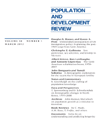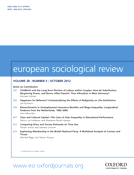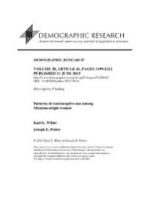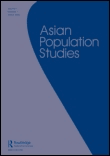
POPULATION AND DEVELOPMENT REVIEW
Scope & Guideline
Navigating the Challenges of Demography and Development.
Introduction
Aims and Scopes
- Demographic Analysis and Trends:
The journal covers various demographic phenomena, including fertility rates, migration patterns, and mortality trends, offering insights into how these factors influence societal structures and policies. - Social and Economic Implications of Population Changes:
Research published in the journal often discusses the socio-economic consequences of demographic transitions, such as shifts in family structures, economic inequality, and public health outcomes. - Interdisciplinary Approaches to Population Studies:
The journal encourages interdisciplinary research that integrates perspectives from sociology, economics, public health, and environmental studies to address complex demographic issues. - Policy-Relevant Research:
A significant focus is placed on providing empirical evidence that can inform public policy and development strategies, particularly in the context of global challenges such as climate change and migration. - Cultural and Geographic Diversity:
The journal highlights the importance of cultural and geographic contexts in shaping demographic trends, with a particular emphasis on low- and middle-income countries.
Trending and Emerging
- Impact of Global Crises on Demographics:
There is a significant trend toward analyzing how global crises, such as the COVID-19 pandemic, affect demographic trends, including fertility, migration, and mortality, reflecting real-time issues faced by societies. - Intersection of Gender and Demographics:
Emerging research emphasizes the intersectionality of gender with demographic factors, exploring how gender roles and expectations shape fertility choices, migration patterns, and family dynamics. - Migration and Refugee Studies:
Increased focus on migration policies and the experiences of refugees highlights the need to understand demographic changes in the context of global mobility and humanitarian crises. - Environmental Factors in Demographic Change:
Research increasingly examines the relationship between environmental changes, such as climate change, and demographic shifts, particularly how these factors influence migration and population health. - Data Innovation in Demography:
The use of novel data sources, including digital trace data and big data analytics, is becoming more prevalent, offering fresh insights into demographic trends and enhancing predictive modeling capabilities.
Declining or Waning
- Traditional Fertility Studies:
While fertility remains a core topic, there is a noticeable shift away from traditional studies focused solely on quantitative fertility rates, with more emphasis now placed on qualitative aspects and broader social implications. - Static Migration Theories:
Older migration models that do not account for contemporary complexities or the fluidity of migration patterns are becoming less relevant, as newer frameworks that consider dynamic socio-political factors gain traction. - Overpopulation Narratives:
The narrative surrounding overpopulation as a singular issue has waned, with a growing recognition of the need for nuanced discussions that incorporate sustainability and resource management rather than solely focusing on population size. - Homogeneous Policy Recommendations:
There is a move away from one-size-fits-all policy recommendations, as more research emphasizes the need for context-specific solutions that consider local cultures, economies, and environments. - Historical Demographic Models:
Research that solely relies on historical demographic models without accounting for contemporary variables and global interdependencies is seeing decreased publication frequency.
Similar Journals

EUROPEAN SOCIOLOGICAL REVIEW
Unpacking the complexities of social structures and policies.European Sociological Review, published by Oxford University Press, stands as a leading journal in the fields of sociology and political science. With an impressive h-index and a 2023 ranking in the top 10th percentile (Q1) of Scopus, it represents a key platform for scholars and practitioners seeking to advance sociological discourse. Since its inception in 1985 and continuing through to 2024, this journal has provided a wide array of high-quality articles that explore various dimensions of sociological theory, research, and application, fostering a deeper understanding of social dynamics. Although not open access, the journal's rigorous peer-review process ensures that only the most impactful research is disseminated, making it an essential resource for academia, policy-making, and social research. By focusing on contemporary sociological challenges and contributing to significant debates, the European Sociological Review is invaluable for researchers, professionals, and students committed to the empirical understanding of societal trends.

POPULATION AND ENVIRONMENT
Connecting Demographic Trends with Ecological ImpactPopulation and Environment is a renowned journal published by Springer, focusing on the critical intersection between demographic processes and environmental changes. Established in 1980, the journal has become a leading platform for interdisciplinary research, with its impressive impact reflected in its 2023 rankings, placing it in the Q1 quartile for both Demography and Environmental Science (miscellaneous) categories. With Scopus Ranks highlighting its prominent position (#11 out of 139 in Social Sciences – Demography, and #46 out of 219 in Environmental Science), Population and Environment fosters a rich dialogue among researchers, professionals, and students dedicated to understanding how population dynamics influence environmental conditions and vice versa. Operating without an open access option, the journal ensures high standards for scholarly contributions and remains committed to bridging knowledge gaps in the realms of population studies and environmental science. The journal's rigorous peer-review process and comprehensive archive from 1980 to 2024 solidify its reputation as an invaluable resource for advancing research and informing policy in these critical fields.

European Journal of Population-Revue Europeenne de Demographie
Unraveling the Complexities of Demographic TrendsWelcome to the European Journal of Population-Revue Europeenne de Demographie, a premier scholarly publication dedicated to advancing the field of demography. Published by Springer since 1985, this journal has established itself as a vital resource for researchers, professionals, and students interested in population studies, evidenced by its Q1 ranking in Demography for 2023 and a notable Scopus ranking within the top 20% of its category. With an ISSN of 0168-6577 and an E-ISSN of 1572-9885, the journal provides a platform for high-quality, peer-reviewed research, contributing to the understanding of population dynamics and demographic trends across Europe and beyond. Although currently not open access, the journal ensures broad mobility of knowledge through diverse access options, aspiring to bridge theoretical insights and practical applications crucial for policy-making and societal engagement. Join us in exploring the intricate tapestry of demographic data as we examine pressing issues such as migration, fertility, mortality, and population aging in an ever-evolving global context.

Revista Latinoamericana de Poblacion
Connecting Diverse Methodologies to Latin America's Demographic LandscapeRevista Latinoamericana de Poblacion is a distinguished open-access journal dedicated to the field of population studies, published by the Asociación Latinoamericana de Población. Since its inception in 2007, the journal has aimed to foster scholarly dialogue and disseminate critical research on demographic dynamics across Latin America. With an emphasis on diverse methodologies and interdisciplinary approaches, the journal serves as a platform for researchers, professionals, and students to engage with pressing issues such as migration, fertility, aging, and socio-economic factors influencing population trends. As an invaluable resource for the academic community, this journal not only promotes accessibility to vital research through its open-access model but also plays a crucial role in enhancing the understanding of demographic changes and their implications in the region. By focusing on the unique context of Latin America, Revista Latinoamericana de Poblacion facilitates a deeper insight into population phenomena that resonate globally.

Papeles de Poblacion
Connecting diverse perspectives in population dynamics.Papeles de Población, published by the Universidad Autónoma del Estado de México, is a prominent open-access journal that has been advancing the field of demography since its inception in 1997. With an ISSN of 1405-7425, this journal aims to foster a deeper understanding of population studies through research articles, reviews, and critical analyses that address the complex dynamics of demographic changes, social structures, and their implications. While currently ranked in the fourth quartile of its category in 2023, it serves as a significant channel for researchers, professionals, and students to disseminate and access cutting-edge findings. Open access since 2004, it provides a platform for broader readership and knowledge sharing, thus contributing to the global discourse on population issues. Based in Mexico, the journal is committed to embracing diverse perspectives, emphasizing the importance of regional studies within a global context.

Demographic Research
Exploring the trends that shape our societies.Demographic Research is a leading journal in the field of demography, published by the prestigious Max Planck Institute for Demographic Research. Available in both print and electronic formats (ISSN: 1435-9871, E-ISSN: 1435-9871), this open-access journal has been a valuable resource for demographers and social scientists since its inception in 1999. With a commendable impact factor and ranked Q1 in its category, the journal demonstrates a significant commitment to advancing our understanding of demographic trends and their implications across contexts. Hailing from Germany, the journal's rich international perspective adds depth to its studies, making it a vital platform for innovative research. Researchers, professionals, and students are encouraged to engage with its wealth of articles that not only document demographic changes but also offer insights critical for policy-making and social planning. The journal's broad scope encompasses diverse themes, providing a comprehensive overview of the demographic shifts that shape societies today.

Asian Population Studies
Pioneering Research in Asian DemographyAsian Population Studies is a distinguished journal published by Routledge Journals, Taylor & Francis Ltd, delivering comprehensive insights into the vibrant field of demography. Since its inception in 2006, this peer-reviewed journal has consistently provided a platform for high-quality research that enhances our understanding of population dynamics in Asia. With an impressive category ranking of Q2 in Demography for 2023, and holding a notable position as 35th out of 139 within the Scopus ranking, it is recognized for its significant contributions to the field, appealing to researchers, scholars, and professionals alike. The journal covers a diverse range of topics, including population growth, migration patterns, and socio-economic factors influencing demographic changes across Asian countries. Although it does not offer open access, Asian Population Studies remains a vital resource for those seeking to explore demographic trends and their implications for policy and practice in one of the most populous regions of the world. With a commitment to academic excellence, it continues to serve as an essential tool for anyone engaged in demographic research and study.

Journal of Population Ageing
Fostering Dialogue on Ageing and SocietyThe Journal of Population Ageing, published by SPRINGER INT PUBL AG, stands as a prominent platform for the exploration and dissemination of research within the fields of demography, geography, and sociology. With an ISSN of 1874-7884 and an E-ISSN of 1874-7876, this journal navigates the complexities of population ageing, a vital topic as societies worldwide confront the implications of an ageing demographic. The journal boasts impressive Scopus rankings, including the 30th rank in Demography and a 78th percentile in Sociology and Political Science, emphasizing its significant role in academic discourse. It is highly regarded in its Q2 category quartiles for Demography, Geography, Planning and Development, and Sociology and Political Science, showcasing its relevance and scholarly impact. Although not an open-access publication, the journal's carefully curated articles aim to inform and advance knowledge, making it an invaluable resource for researchers, professionals, and students invested in understanding the multifaceted challenges associated with an ageing population. With its comprehensive scope and commitment to quality, the Journal of Population Ageing continues to contribute meaningfully to the evolving conversation on demographic trends and their societal implications.

POPULATION
Connecting Research with Real-World Demographic ChallengesPopulation, an esteemed journal published by the Institut National d'Études Démographiques (INED), serves as a critical platform for the dissemination of high-quality research in the field of demography. With the ISSN 0032-4663 (Print) and E-ISSN 1957-7966 (Online), this journal covers a wide spectrum of topics related to population studies, including migration, fertility, mortality, and population policy, offering a comprehensive lens on demographic trends that influence societies worldwide. Although it operates under a traditional subscription model, its rigorous peer-review process ensures that only the most impactful and relevant research findings are published. With its long-standing reputation among scholars and practitioners in the demographic domain, Population plays a vital role in shaping the academic discourse and guiding future research directions. Scholars, professionals, and students alike will find in its pages not only innovative perspectives but also critical insights that reflect the complexities of population dynamics in a rapidly changing world. For those dedicated to understanding the demographic challenges that societies face today, this journal remains an invaluable resource.

Canadian Studies in Population
Connecting History with Population InsightsCanadian Studies in Population, published by Springer, is a prestigious journal dedicated to advancing the field of demography and the history of population studies within Canada and beyond. With an ISSN of 0380-1489 and an E-ISSN of 1927-629X, this journal has proudly contributed to scholarly discourse since its inception in 1975, and continues to make significant impacts through its rigorous research articles and comprehensive reviews. Recognized for its high academic standards, it boasts a Q2 ranking in Demography and a Q1 ranking in History in 2023, reflecting the journal's critical role in shaping contemporary understanding of demographic trends and historical population developments. With a Scopus rank of #51/139 in Demography and #83/1760 in History, it appeals to a diverse audience including researchers, professionals, and students eager to explore population dynamics, historical context, and societal implications of demographic shifts. While the journal maintains traditional subscription access options, its rigorous peer-reviewed content ensures that it remains a cornerstone for scholars seeking credible and influential insights in their respective fields.